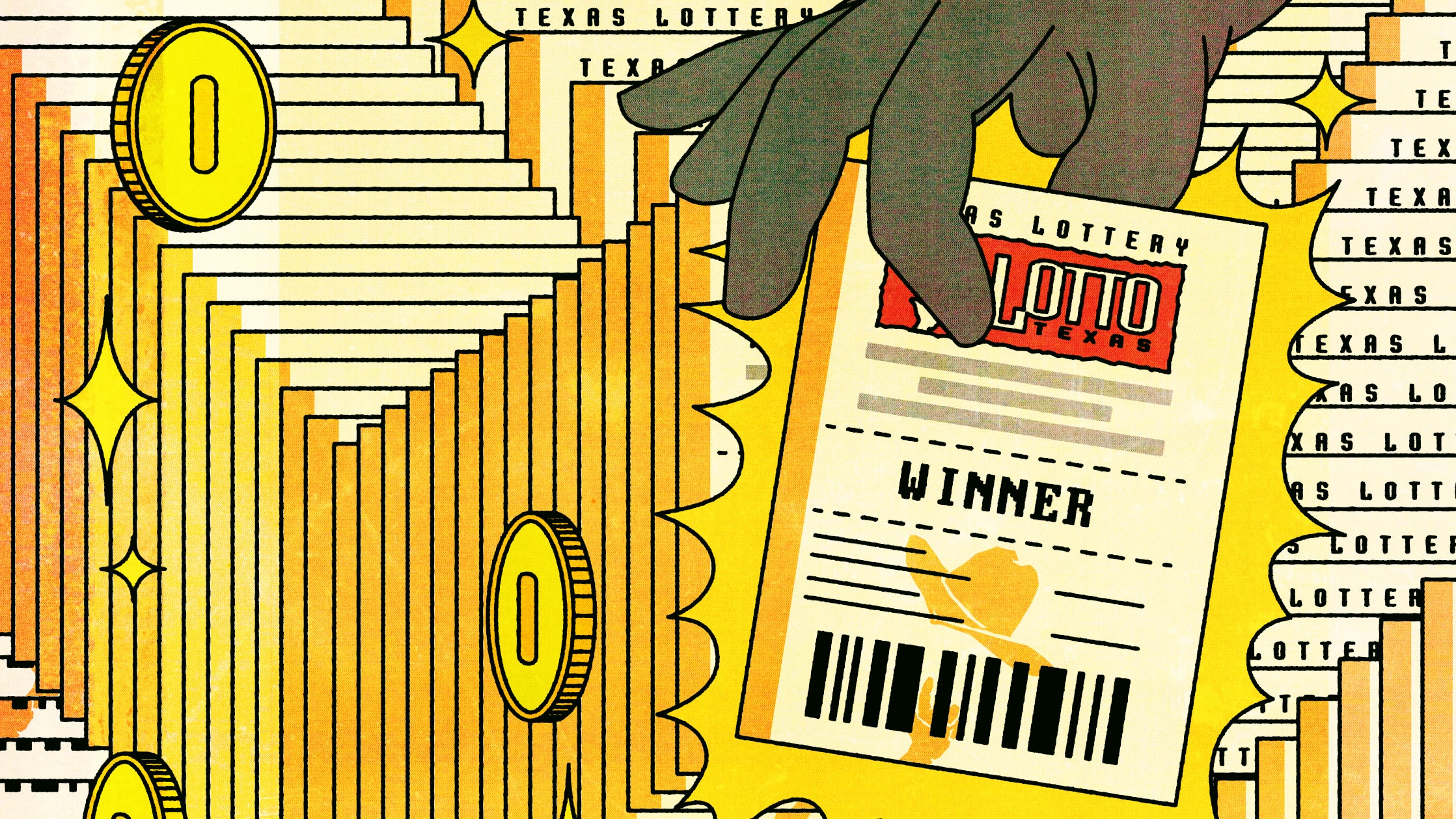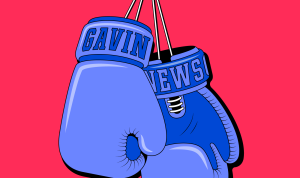When a “purchasing group” won a ninety-five-million-dollar jackpot, the victory caused a scandal in a state where opposition to legal gambling remains widespread.
On Wednesday, April 19, 2023, the Lotto Texas jackpot was seventy-three million dollars. There was no winner that night—there hadn’t been a winner for the past ninety-one drawings—and so the pool of money rolled over. By the next drawing, that Saturday, it had reached ninety-five million. Dawn Nettles started getting worried. For the jackpot to have grown so quickly, sales volume must have been ten times what Nettles thought was normal. “I knew right then,” she told me. “Somebody was buying all the combinations.”
Nettles is seventy-four, with cropped copper hair and the bearing of a gently exasperated elementary-school teacher. She lives in Garland, a suburb of Dallas, with her husband, a flight instructor, and she devotes her days to theLotto Report, a publication closely tracking the Texas Lottery. In the three decades since she started theReport, Nettles has evolved from being an enthusiast of the lottery to perhaps its most biting critic.
There are nearly twenty-six million possible combinations for Lotto Texas; Powerball, in comparison, has nearly three hundred million. A player, or a group of players, with the financial and logistical resources can effectively guarantee a win—and, if the prize pool is big enough, a hefty profit. This idea struck Nettles as immensely unfair. That week, she bought more tickets than she had in years. “I kept saying, ‘God, come on, let me hold the winning ticket so these people don’t come out ahead,’ ” she said.
That Saturday, the Texas Lottery Commission put out a press release celebrating the “rare and very exciting opportunity for our players”: the biggest Lotto Texas jackpot in more than a decade. “Players are turning out in droves to have the exclusive chance at winning the largest jackpot prize on the continent,” Gary Grief, the lottery’s executive director, said. Nettles posted an update to theLotto Reportwebsite. “I fear tonight will be a very sad night for Texas Lottery players,” shewrote. “Now the Texas Lottery is probably going to be successful in screwing every player and retailer that resides in Texas.”
There are plenty of Texans who oppose the lottery for moral reasons. Nettles is not one of them. Some of her earliest memories involve accompanying her grandmother to a bingo hall in Wichita Falls; at one point, she told me, she considered Las Vegas her “home away from home.” She became interested in small-scale publishing, and went on to run a real-estate magazine calledUnexaggerated Homes of Dallas, in which, she said, “builders could not use adjectives—what you see is what you get.” Shortly after Texas launched its lottery, in 1992, Nettles began producing theLotto Report, a print newsletter that she likened to the racing forms sold at racetracks. Gamblers are mystics at heart, and lottery players see all sorts of patterns in the supposedly random sequences of winning numbers. TheLotto Reportprovided fodder for their scrying. “It was basically telling a story about all the numbers, what’s been drawn with what, what’s overdue, what the good pairs are,” she said. “Just a complete, thorough deal on the numbers.”
Nettles came to feel that the Texas Lottery was being badly run, and was perhaps even corrupt. TheLotto Reportbecame something of a watchdog publication, railing against rule changes and the lottery commission’s wasteful spending. The website version launched in 1998, and its look hasn’t changed much in the intervening decades. Its aesthetic could be summed up as “crank-adjacent”: there is an overwhelming amount of erratically capitalized and bolded text, punctuated with exclamations like “Unreal!” and “Unbelievable!” and “If you have high blood pressure, don’t read any further!” In 2014, NettlestoldtheTexasTribunethat she was spending fourteen to sixteen hours a day keeping tabs on the lottery. She showed up at commission meetings, made public-records requests, and scrutinized the director’s spending. She lobbied against a rule revision that allowed winners to remain anonymous and accused the commission of not paying winners their full share. (After an internal investigation, the lottery commission concluded that it had followed policy.) At one point, she says, the lottery removed her from its media list, so she no longer got official results via fax. “I thought, Fine, I’ll show you. So I got me a satellite feed so I could watch the drawings in real time,” she said. Rob Kohler, a former employee of the Texas Lottery, told me that, early in his career, he’d planned a conference for the North American Association of State and Provincial Lotteries. He got word that a group of protesters had shown up. “I was, like, Good Lord,whocould be protesting this conference?” he said. “And there was Dawn Nettles.”
As Nettles had predicted, on April 22nd, someone won the ninety-five-million-dollar jackpot. Grief, the Texas Lottery director, soon acknowledged that “purchasing groups” had been involved. The bulk buy was recognized as unfair but legal; the lottery paid out the prize money, which, after taxes, amounted to nearly fifty-eight million dollars. (The HoustonChronicleeventuallyreportedthat a London-based gambling syndicate had bankrolled the operation.) Two years later, it has become a full-blown scandal. The Texas Rangers have been called in to investigate what Dan Patrick, Texas’s lieutenant governor, has called “the biggest theft from the people of Texas in the history of Texas.” (No criminal charges have been filed; the lawyer that represents Rook TX, the Delaware L.L.C. that claimed the jackpot, has said that “all applicable laws, rules and regulations were followed.”)
At least some of the credit for the recent scrutiny of the Texas Lottery is due to Nettles’s persistence. As she saw it, if she had figured out before the drawing that a bulk buy was in the works, how could the Texas Lottery not have known? And, if the commissioners had known, why had they let it happen? She kept calling Kohler, who, after leaving the Texas Lottery, became the state’s top anti-gambling lobbyist, working for the Baptist-affiliated Christian Life Commission. “Bless her heart, she was just busting my chops,” Kohler told me. “If folks would have taken the time to listen to her, instead of taking her suggestions as an affront, well, I tell you, we’d never be where we’re at right now.”
The most consequential political battles in Texas happen not between Democrats and Republicans—there’s not much suspense in a state so thoroughly dominated by one party—but within Republican factions. Gambling is one of the subjects that reveals ideological fault lines: pro-business Republicans frame it as a “freedom and liberty issue,” as one lawmaker hasput it, and moralizers see it as state-subsidized sin.
Nearly forty states have legalized some form of sports gambling, most of them having done so after 2018, when the Supreme Court struck down the Professional and Amateur Sports Protection Act, which had restricted sports betting to Nevada. The interest has spilled over into other forms of gambling. Casino attendance is up, and the average age of visitors has dropped from fifty to forty-two. So far, though, Texas has resisted many forms of gambling. It has long prohibited non-tribal casinos and sports betting, despite lobbying from powerful figures, including Jerry Jones, the owner of the Dallas Cowboys, and Miriam Adelson, a casino magnate who also owns the Dallas Mavericks. For the past few legislative sessions, armies of lobbyists have descended on the state capitol, in Austin, trying to push for various forms of gambling.
Until recently, the lottery had been something of an afterthought. “There’s a concern in the lottery space about the aging customer base, especially as you have all these new gambling options in a lot of states,” Matt Carey, a reporter who covers the gambling industry forVIXIO, told me. In recent years, a new kind of company has been targeting a younger demographic, countering this concern. Lottery couriers, as they are known, pitch themselves as Uber or DoorDash for lottery players, providing an easy-to-use interface that allows users to buy tickets on their phones. “The couriers are trying to attract a player that isn’t, you know, my dad—somebody in their twenties or thirties who’s used to doing everything on their phone and hasn’t traditionally been a lottery player,” Carey said.
Nettles became aware of the courier companies around 2019, when she noticed that a handful of stores seemed to be selling an inordinate number of winning tickets. She went to visit one, Winner’s Corner, in a nondescript building in North Austin. Texas law mandates that lottery venders be open to the public and sell things other than lottery tickets. At Winners Corner, which is owned by a courier company called Jackpocket, a table by the register was stacked with board games. The real business took place in a back room, where dozens of lottery terminals churned out tickets for online customers and machines removed the surfaces from scratch-offs. In 2024, Winners Corner was by far the most popular lottery retailer in the state, selling a hundred and seventy-nine million dollars’ worth of lottery tickets, more than the next twenty-five retailers combined; 99.9 per cent of those sales were made to online customers,accordingto theTexasTribune. Jackpocket, which was founded in a SoHo WeWork space in 2013, has since been acquired by the sports-betting juggernaut DraftKings, for some seven hundred and fifty million dollars.
The legal status of lottery couriers is still evolving. New York and New Jersey have established processes to license them, and a handful of other states have banned them. A Texas law from the early nineties prohibits lottery sales from happening “over the phone,” to discourage underage or out-of-state buyers. A state audit later concluded that Grief “seemed quite comfortable operating in the gray areas of the State Lottery Act,” particularly when it came to courier companies. Grief maintained that his agency had no ability to regulate couriers, but his approach was hardly hands-off. “The lottery openly welcomed couriers,” said Thomas Metzger, the C.E.O. and founder of Lotto.com, a courier company, who told me that he spoke with Grief or his deputies on a weekly basis. Operating in a regulation-free environment made some courier companies uneasy. “We actually drafted and proposed regulations several times,” Metzger claimed, but, he said, the Texas Lottery didn’t take them up on the suggestions. (Grief’s attorney has said that his client “adamantly denies being part of any dishonest, fraudulent, or illegal scheme.”)
In the aftermath of the 2023 bulk buy, Texas politicians put much of the blame on the couriers. The couriers, for their part, have argued that they’re being scapegoated to deflect attention away from broader issues within the Texas Lottery Commission. In any event, the freewheeling atmosphere in Texas seems to have attracted businesses with questionable pedigrees. Lottery.com, which ended up managing the on-the-ground logistics for the 2023 lottery plan, relocated from California to Texas in 2017. One founding executive, who identified himself as a “crypto thought leader,” was involved in a plan, after Hurricane Maria, to transform Puerto Rico into a Bitcoin utopia.
Lottery.com seems to have struggled, initially. One potential investor, who visited the Lottery.com’s offices in Austin,toldBloomberg Tax, “I said, this isn’t a corporate office; this is a failed 7-Eleven with three goddamn machines.” In 2022, an investigation found that the company had sold more than half a million tickets to out-of-state players, which is illegal. Three top executives left the company. Two of them, Ryan Dickinson and Matt Clemenson, have since pleaded guilty to separate securities-fraud charges. That same year, the company stopped selling lottery tickets, its license as a lottery retailer in Texas was suspended, and its app was removed from the Apple and Google stores.
Texas Lottery executives initially portrayed the 2023 bulk buy as having caught them by surprise, but later testimony and reporting has called this into question. That April, Lottery.com’s retailer license was reinstated, and shortly thereafter the Texas Lottery Commission fielded an urgent request for dozens of ticket-printing terminals. Such a request was “very unusual,” Texas Lottery’s then deputy director, Ryan Mindell, later admitted. Metzger, of Lotto.com, got word that a bulk-buying operation was in the works—“let’s put it this way, the lottery industry is a small place,” he said—and reached out to Grief around a week before the drawing, cautioning him against providing the terminals. “Regardless of whether it was legal, I knew the optics were going to be terrible if someone outside of Texas won a local game,” he told me. But, according to a lawsuit filed by Lotto.com against the Texas Lottery Commission, Grief dismissed his concerns and “responded by saying that he thought Metzger was a ‘free market guy.’ ” IGT, the company that runs lottery operations in the state, delivered and installed the terminals to four locations; in short order, they were being used to generate millions of tickets. (Although courier companies were central to planning the bulk buy, the ticket purchases took place within the state, and not via their apps.)
It remains to be determined how much of this, if any, was illegal. In any case, the fallout has been dramatic, and much of the negative publicity has fallen on the courier companies. Grief retired abruptly last year. Mindell, his deputy, took over and promptly banned couriers. (A newly formed advocacy group, the Coalition of Texas Lottery Couriers, which includes representatives from Jackpocket, Jackpot.com, and Lotto.com, argued that the Texas Lottery Commission “ignored the warning, bent the rules, and provided the terminals necessary for an international syndicate to game the system” and “allowed lottery couriers to become the scapegoat for its own questionable activities.”) Then, this past April, Mindell resigned. TheTexasScorecard, an influential far-right news site, has been unrelenting in its criticism of pro-lottery Republicans. It seemed, briefly, that state lawmakers might vote to end the lottery entirely. At the last minute, they elected to disband it in its current form and reformulate it under a different state agency. The prospect of expanding gambling in Texas seems highly unlikely.
Nettles is still getting used to being taken seriously by powerful people. In February, at a legislative hearing about the Texas Lottery’s future, she put her name on the list to give public testimony, as she had many times before. Once her allotted three minutes were up, she grabbed her purse and began to walk away. The lawmakers called her back. “Ma’am, before you go, you’ve made some very good, specific suggestions,” one said. “Do you have some others that need to be made?”
I recently met Nettles at a Starbucks in Waco, the midway point between our homes, where she ordered her vanilla latte without a lid so that there was room for extra whipped cream on top. She had brought her laptop to update theLotto Reportwith the most recent numbers. “There are a hundred and twenty-seven drawings a week,” she grumbled. “It’s ridiculous.” When she started the publication, there were fewer than a dozen.
She seemed nostalgic for the early days. The jackpots weren’t enormous, but they were big enough to change your life. At some point, however, thelottery got addicted to growth: Powerball, Mega Millions, additional drawings, ballooning jackpots, convoluted games, fifty-dollar scratch-offs, hundred-dollar scratch-offs.
“I like to play. I like to play cards, and dominoes, and that sort of thing. It was just fun,” she said. “Before the lottery was voted in, people kept saying, ‘You don’t want that.’ ‘That’s corruption.’ ‘That’s bad.’ I didn’t listen to them, because I thought, That just can’t be. But it turns out all those people were right. We shouldn’t have it, because money is evil. I’ve always known that money is evil—it was just the fact that I like to play. I’m a player, yeah. But I don’t play like I did.” ♦









